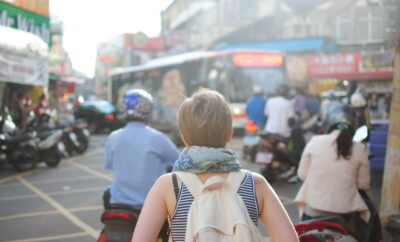
The Gen XY Lifestyle
Enjoy your trip with less stress when you have travel insurance
Asia has so much to offer for travellers and tourists, from cultural diversity to natural beauty. That’s why you want to make the most of your trip, whether you’re visiting the historical sites of Vietnam, experiencing the nightlife of Thailand, or discovering the wildlife of Indonesia.
However, it is realistic to assume that travelling can pose some risks and challenges that you need to be prepared for.
One of the things that you should never travel without is travel insurance. Travel insurance can protect you from unforeseen expenses and losses that may occur before or during your trip, such as flight cancellations, medical emergencies, baggage delays, or theft.
Travel insurance can also provide you with assistance and support in case you encounter any problems or difficulties while abroad.

Some countries in Asia have made travel insurance mandatory for visa applicants or visitors, such as Japan, Sri Lanka and Nepal. Therefore, it is advisable to get a travel insurance policy that covers your specific needs and destination, and to read the terms and conditions carefully before you purchase it.
Travel insurance can give you peace of mind and help you enjoy your trip without worries.
The General Insurance Association of Singapore (GIA) shares some observations and insights with us about travelling during this period.
the Active Age (AA): What are the areas that I should ensure that I am covered for when purchasing my travel insurance? What are the most common claims by travellers?
GIA: When purchasing travel insurance, the primary focus should be on protecting yourself against high-value losses that could lead to significant financial strain.
While coverage for common travel inconveniences such as baggage loss or delay and travel misconnections is important, the key advantage of travel insurance lies in safeguarding against substantial unforeseen expenses.
Here are the critical areas to ensure coverage:
- Overseas Medical Expenses: Medical emergencies abroad can result in exorbitant costs. Coverage for overseas medical expenses is essential, especially considering that medical care in foreign countries can be expensive and may require upfront payment.
- Emergency Medical Evacuation and Repatriation: In situations where medical treatment is not adequate at your travel destination, or if you need to be transported back to Singapore for treatment, the costs can escalate quickly into six figures. These scenarios have been widely reported in the media, where travellers without adequate coverage have resorted to crowdfunding to cover these hefty bills.
- COVID-19 Related Coverage: With the ongoing pandemic, insurance for COVID-19 related expenses before, during, and after your trip is crucial. This includes coverage for overseas medical expenses due to COVID-19, emergency medical evacuation, hospital and quarantine allowances, and trip cancellation or curtailment if you or your travel partner contract COVID-19. Post-trip medical expenses related to COVID-19 are also covered up to a specific number of days after returning to Singapore.
During peak travel periods such as the upcoming Chinese New Year, when social interactions and travel activities increase, ensuring your policy covers COVID-19 related interruptions and medical expenses is especially important. This comprehensive coverage offers peace of mind in the face of the pandemic’s uncertainties.
*Note: GIA does not collect granular statistics on claims made for travel insurance and does not have information on the top claim categories.

AA: I have pre-existing medical conditions such as high blood pressure and diabetes. Can I just purchase regular travel insurance? What happens if I do not declare my existing medical condition when purchasing my travel insurance policy?
GIA: Not all travel insurance policies cover pre-existing medical conditions such as high blood pressure and diabetes. If you or your loved ones have pre-existing medical conditions, you are advised to look for suitable policies that provide coverage for these conditions.
These travel policies typically include coverage for overseas medical expenses, hospitalisation cash and emergency medical evacuation costs that may arise during travel relating to the traveller’s pre-existing medical condition.
Depending on policy, however, other benefits such as trip cancellation because of the traveller’s medical condition may not apply. This means that should your loved one have to visit the hospital because of his / her diabetic condition before the trip and had to cancel, he / she may not be able to make a claim.
Travellers who require more coverage can also purchase personal accident insurance to supplement their travel insurance benefits.
Failing to declare existing medical conditions when purchasing travel insurance can lead to the insurer rejecting the claims made. It’s crucial to disclose all relevant health information to ensure appropriate coverage.
We encourage all travellers to understand their policy terms and conditions, exclusions as well as benefits before their trip.
AA: I will be travelling with my elderly parents this holiday season. Anything I should take note of when purchasing travel insurance for them?
GIA: As some insurers provide a lower medical coverage limit for travel insurance policies for seniors over 70 years old, it is important to understand the benefits available for different policies before purchasing one that is the most suitable.
For instance, if you’re travelling to a long-haul destination or a destination where medical services are not easily accessible, you might want to consider purchasing a policy that offers higher medical coverage, emergency evacuation and repatriation benefits for your elderly loved one, in case of any unforeseen circumstances.
When purchasing travel insurance for elderly parents, it is also important to consider their specific health needs and ensure that any pre-existing medical conditions are covered by the policy.

AA: How can I best protect my luggage through travel insurance when travelling to destinations such as Europe and the US?
GIA: To provide sufficient cover for your luggage, choose travel insurance policies that offer comprehensive coverage for loss, theft, and damage to personal belongings. This can include compensation for the loss of personal belongings, clothes, gadgets, and other items. Also, keep an inventory of your belongings and their value.
For expensive or high-value items such as jewellry, cameras, or laptops, it’s important to check the policy’s coverage limit per item. Some policies might require you to declare these items separately or purchase additional coverage.
Be aware of policy exclusions and limitations. Some policies may not cover certain items or may only offer limited coverage for items lost or stolen under specific circumstances (e.g., leaving luggage unattended in a public place may not be covered).
In the event of luggage delay by the airline, many travel insurance policies offer compensation to cover the cost of essential items, such as clothing and toiletries, until your baggage arrives. Typically, these policies specify a minimum delay time (for example, 6-12 hours) before this coverage becomes applicable. It’s important to note that while this benefit is commonly included in travel insurance policies, the specifics can vary among different insurers. Therefore, it is advisable to review the terms and conditions of your policy to understand the exact coverage details.
AA: What are some best practices to note when preparing to make a claim, what level of documentation and records is required?
GIA: Travellers should work closely with their insurers on submitting travel insurance claims.
While insurers often have different procedures for the submission of claims, each insurer would generally require travellers to complete a claim form and submit supporting documents related to the claim. These would include documents such as carrier irregularity reports from the transport provider substantiating delays or police reports for lost or stolen personal belongings.
Providing more documentation or evidence of loss can help insurers expediate the claim and make the payout faster.
Many insurers also offer digital claims services through dedicated mobile apps and online.
Here are additional online resources you can read about baggage delay and loss/damage to personal effects.
AA: Any other points to take note of when it comes to purchasing travel insurance policies?
GIA: Travellers are encouraged to purchase travel insurance upon confirming their travel plans as they can benefit from pre-trip cover such as trip cancellation or postponement, travel agency insolvency and other protection. The earlier that the plan is purchased, the earlier the individual will be insured against unforeseen circumstances that may affect their planned trip.
If you might be thinking of engaging in higher risk activities such as skiing or canoeing, you’re encouraged to review your policy to ensure that these activities are covered under medical expenses, death and permanent disability. Policies that cover for personal liability relating to these higher risk activities is also important in case of any injury or damage you cause to others.
Lastly, always read the policy wording carefully to understand the coverage and exclusions and speak to your insurer if you have any questions. It is important to consider your needs then look for a travel insurance policy that meets your needs.
Photos by Luca Bravo, by shawnanggg and by Rach Teo on Unsplash









